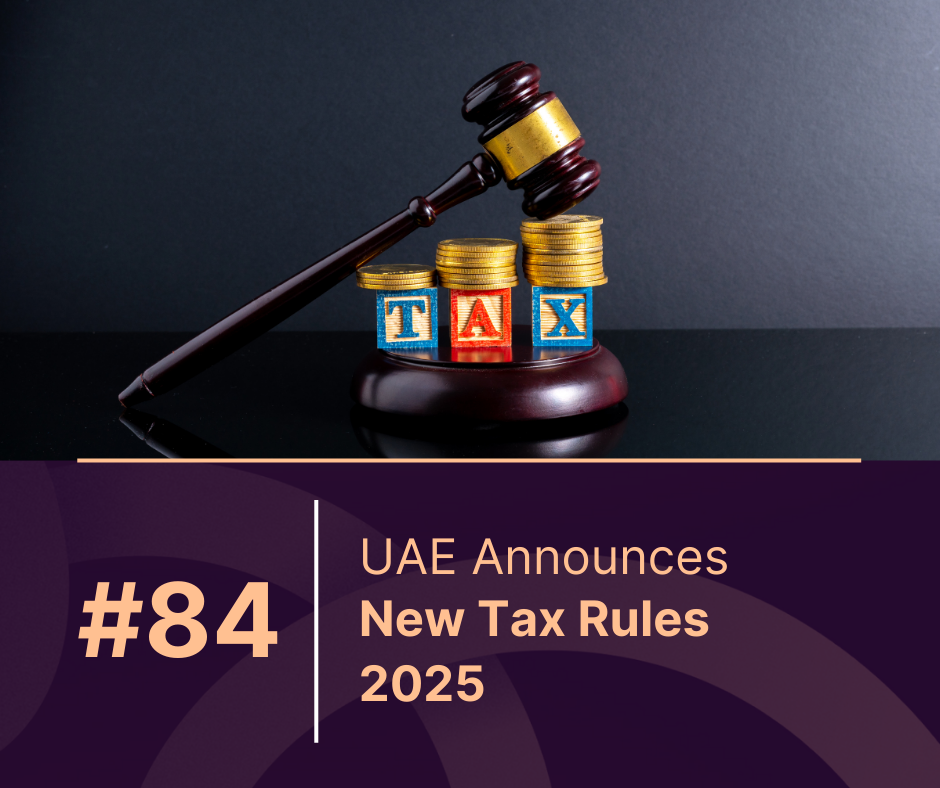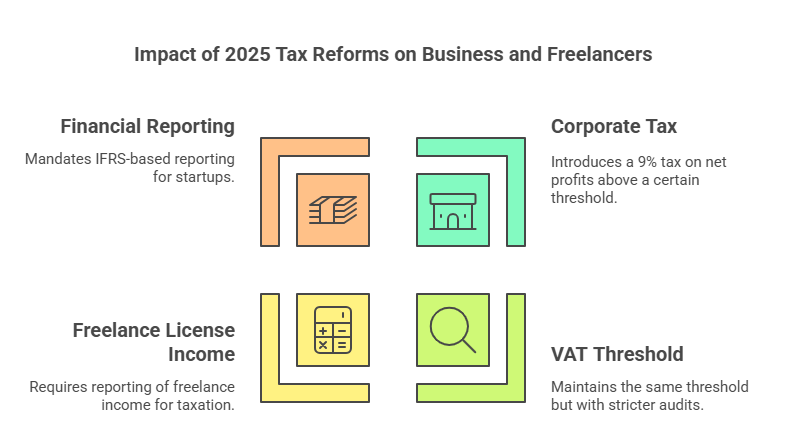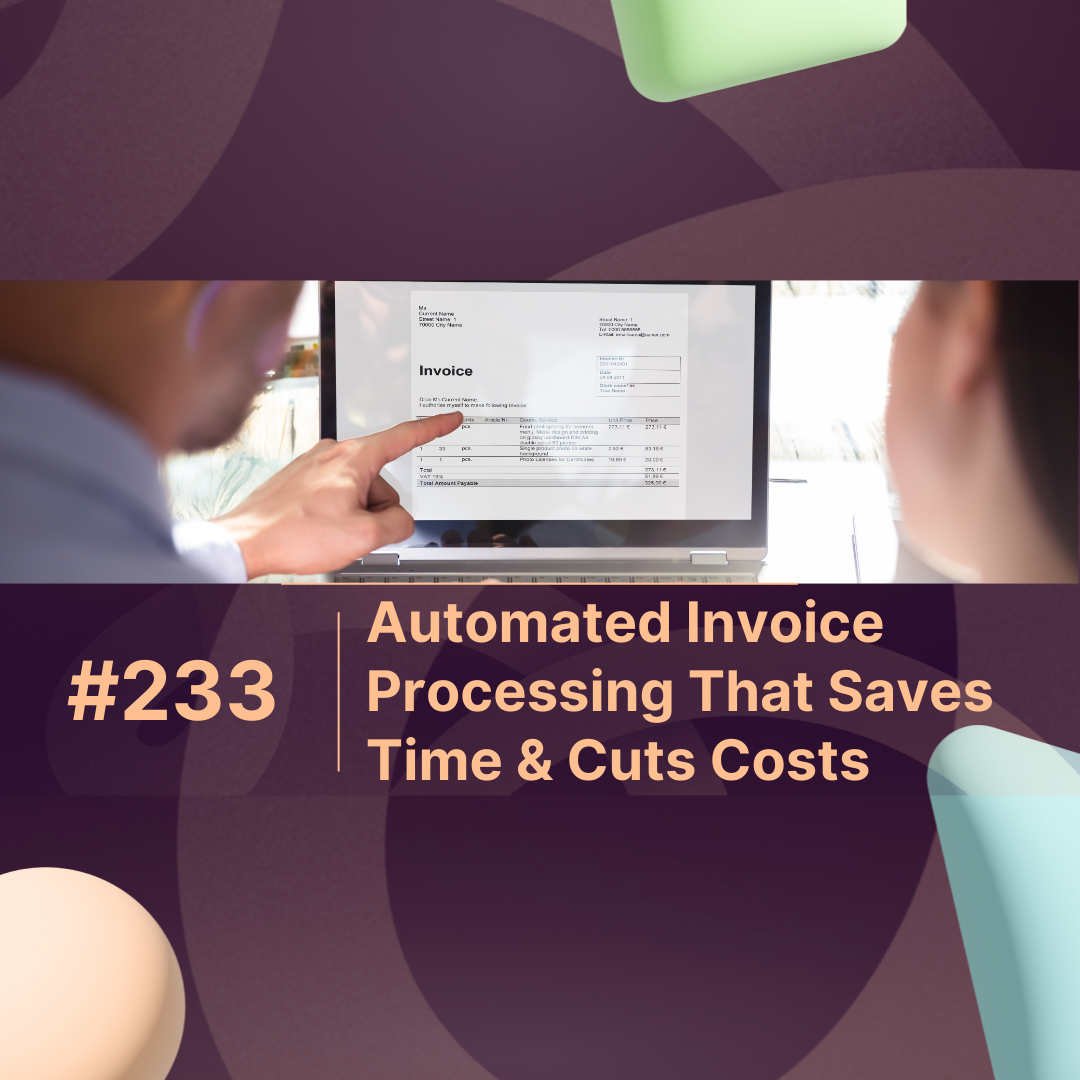Overview
As the UAE continues to position itself as a competitive global business hub, new tax regulations introduced in 2025 are poised to impact startups, entrepreneurs, and investors alike. With the government taking steps to diversify revenue streams and increase regulatory transparency, “UAE announces new tax rules“ is a headline every business owner should pay attention to.
This guide explains the recent updates, how they affect startups, and what entrepreneurs must do to remain compliant while optimizing operations under the new system.
What You Need to Know: Key Tax Changes in 2025
The UAE has introduced several changes to its tax structure, including updates to corporate tax, VAT compliance, freelancer regulations, and reporting requirements. These changes mark a significant shift in the UAE’s approach to business regulation.
Highlights of the New Tax Rules
| Tax Area | Previous Status | New Rule (2025) |
|---|---|---|
| Corporate Tax | 0% for most businesses | 9% tax on net profits above AED 375,000 |
| VAT Threshold | AED 375,000 | Remains the same, but with stricter audits |
| Freelance License Income | Not fully regulated | Income must now be reported for taxation |
| Financial Reporting | Basic requirements | Mandatory IFRS-based reporting for startups |
Impact on Startups and Entrepreneurs
1. Corporate Tax on Profits Above AED 375,000
One of the most significant updates is the corporate income tax of 9% on profits exceeding AED 375,000. While this still keeps the UAE’s rate low globally, it marks a shift from the previous tax-free model that attracted startups.
Startups should now implement structured accounting practices to differentiate taxable from non-taxable income, especially if they are scaling rapidly.
2. Increased VAT Scrutiny
Although the VAT threshold remains unchanged, enforcement has tightened. Businesses must maintain accurate records and submit returns timely to avoid penalties.
Startups using freelancers or service-based models should pay attention to reverse charge mechanisms and input tax credits.
3. Freelancers & Self-Employed Individuals
As UAE announces new tax rules, freelancers and independent entrepreneurs are now required to declare and report all earnings. Those making above the VAT threshold may be required to register and comply with corporate tax obligations.
This encourages a move toward formalizing freelance operations, improving transparency but adding compliance responsibility.
4. Compliance with Global Accounting Standards
Startups must align their financial reporting with International Financial Reporting Standards (IFRS). This helps maintain credibility with investors, especially when raising funds or applying for grants under the UAE’s various innovation programs.
How to Stay Compliant and Optimize Tax Strategy
Here are a few actionable steps:
-
Register early: If you’re close to or above the tax thresholds, register with the UAE Federal Tax Authority (FTA) immediately.
-
Invest in accounting software: Automate your tax filing, expense tracking, and reporting.
-
Hire a tax consultant: Especially for growing startups, expert guidance can save significant costs and ensure you remain compliant.
-
Understand tax exemptions: Some free zones may still offer partial or full exemptions. Be sure to confirm eligibility.
Conclusion
The fact that UAE announces new tax rules reflects a maturing economy and a push toward transparency and sustainable growth. For startups and entrepreneurs, this presents both challenges and opportunities. With proper planning, the new tax landscape can be navigated effectively, ensuring long-term growth, investor confidence, and legal compliance.
By understanding and acting on these changes now, startups can build a stronger, more resilient business that is well-positioned for the future.
FAQs
1. Who is affected now that the UAE announces new tax rules?
Startups, SMEs, freelancers, and any businesses earning above AED 375,000 annually are now subject to corporate tax.
2. Do businesses in free zones have to pay corporate tax?
Not necessarily. Some free zones still offer exemptions, but businesses must ensure they don’t transact directly with mainland clients or risk losing the benefit.
3. Is VAT affected under the new rules?
While the rate remains unchanged, compliance and audit frequency have increased. Accurate record-keeping is essential.
4. What accounting standard is now required?
Businesses must follow IFRS (International Financial Reporting Standards) for transparency and compliance.
5. How can startups reduce their tax liability?
Utilize deductions, expense tracking, and consult tax advisors to optimize tax strategy legally.




